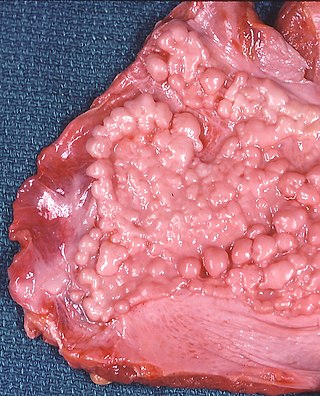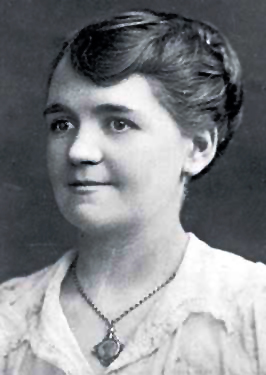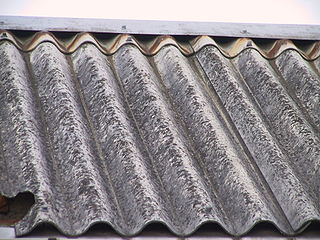
Ambler is a borough in Montgomery County, Pennsylvania. It is located approximately 16 miles (26 km) north of Center City Philadelphia.

Asbestosis is long-term inflammation and scarring of the lungs due to asbestos fibers. Symptoms may include shortness of breath, cough, wheezing, and chest tightness. Complications may include lung cancer, mesothelioma, and pulmonary heart disease.

Chrysotile or white asbestos is the most commonly encountered form of asbestos, accounting for approximately 95% of the asbestos in the United States and a similar proportion in other countries. It is a soft, fibrous silicate mineral in the serpentine subgroup of phyllosilicates; as such, it is distinct from other asbestiform minerals in the amphibole group. Its idealized chemical formula is Mg3(Si2O5)(OH)4. The material has physical properties which make it desirable for inclusion in building materials, but poses serious health risks when dispersed into air and inhaled.

USG Corporation, also known as United States Gypsum Corporation, is an American company which manufactures construction materials, most notably drywall and joint compound. The company is the largest distributor of wallboard in the United States and the largest manufacturer of gypsum products in North America. It is also a major consumer of synthetic gypsum, a byproduct of flue-gas desulfurization. Its corporate offices are located at 550 West Adams Street in Chicago, Illinois.

Ferodo is a British brake company based in Chapel-en-le-Frith in High Peak, Derbyshire.
James Hardie Industries plc is a global building materials company and the largest global manufacturer of fibre cement products. Headquartered in Ireland, it is a dual-listed company, being listed on the Australian and New York Stock Exchanges. Its management team currently sits in Chicago, Illinois, United States. James Hardie was plagued by several asbestos-related scandals in the 20th century.

Johns Manville is an American company based in Denver, Colorado, that manufactures insulation, roofing materials and engineered products. For much of the 20th century, the then-titled Johns-Manville Corporation was the global leader in the manufacture of asbestos-containing products, including asbestos pipe insulation, asbestos shingles, asbestos roofing materials and asbestos cement pipe.
The mineral asbestos is subject to a wide range of laws and regulations that relate to its production and use, including mining, manufacturing, use and disposal. Injuries attributed to asbestos have resulted in both workers' compensation claims and injury litigation. Health problems attributed to asbestos include asbestosis, mesothelioma, lung cancer, and diffuse pleural thickening.
Federal-Mogul Corporation is an American developer, manufacturer, and supplier of products for automotive, commercial, aerospace, marine, rail, and off-road vehicles, as well as industrial, agricultural, and power-generation applications. It was acquired in February 2022 by Apollo Global Management.

RSA Insurance Group Limited is a British multinational general insurance company headquartered in London, England. RSA has major operations in the United Kingdom, Ireland, Scandinavia & Canada. It provides insurance products and services in more than 100 countries through a network of local partners. It has 9 million customers. RSA was formed by the merger of Sun Alliance and Royal Insurance in 1996.
Bulembu is a small town located in northwestern Hhohho, Eswatini, 10 km west of the town of Piggs Peak and close to the border with South Africa. Located above the Komati Valley in Eswatini's Highveld, Bulembu is named after the siSwati word for a spider's web.

Asbestos is a naturally occurring fibrous silicate mineral. There are six types, all of which are composed of long and thin fibrous crystals, each fibre being composed of many microscopic "fibrils" that can be released into the atmosphere by abrasion and other processes. Inhalation of asbestos fibres can lead to various dangerous lung conditions, including mesothelioma, asbestosis, and lung cancer. As a result of these health effects, asbestos is considered a serious health and safety hazard.

The Armley asbestos disaster is an ongoing health issue originating in Armley, a suburb of Leeds, West Yorkshire, England. Described by Dr. Geoffrey Tweedale as a "social disaster", it involved the contamination with asbestos dust of an area consisting of around 1,000 houses in the Armley Lodge area of the city.

Keasbey and Mattison Company was a manufacturing company that produced asbestos-related building products, including insulation and shingles. Founded in 1873 by Henry Griffith Keasbey (1850-1932) and Richard Van Zeelust Mattison (1851-1935), the company moved to Ambler, Pennsylvania, in 1881. By World War I, the Keasbey and Mattison Company's presence caused Ambler to be known as the "asbestos capital of the world". Keasbey and Mattison was purchased by Turner & Newall in 1934.
The Spodden Valley asbestos controversy arose in May 2004 when approximately 72 acres (290,000 m2) of land in Spodden Valley in Rochdale, England, formerly used by Turner Brothers Asbestos Company, and the site of the world's largest asbestos textile factory, was sold to MMC Estates, a property developer. The developer subsequently submitted a planning application to Rochdale Metropolitan Borough Council in December 2004 to build an "urban village" consisting of 650 homes, a children's daycare centre and a business park on the site. The planning application summary claimed: "of particular note is the absence of any asbestos contamination". However, asbestos containing materials were abundantly visible on the ground, and local residents claimed that there were numerous asbestos dumping sites across the area, and that the woodland there had been heavily contaminated with asbestos dust. Site clearance work had begun as early as May 2004, prior to the submission of the application, including tree felling and soil disturbance, and some waste had been removed on flatbed trailers and open trucks. In September 2005 MMC admitted that the woods were significantly contaminated with asbestos.

Nellie Kershaw was an English textile worker from Rochdale, Lancashire. Her death due to pulmonary asbestosis was the first such case to be described in medical literature, and the first published account of disease attributed to occupational asbestos exposure. Before his publication of the case in the British Medical Journal, Dr William Edmund Cooke had already testified at Kershaw's inquest that "mineral particles in the lungs originated from asbestos and were, beyond reasonable doubt, the primary cause of the fibrosis of the lungs and therefore of death". Her employers, Turner Brothers Asbestos, accepted no liability for her injuries, paid no compensation to her bereaved family and refused to contribute towards funeral expenses as it "would create a precedent and admit responsibility". She was buried in an unmarked pauper's grave. The subsequent inquiries into her death led to the publication of the first Asbestos Industry Regulations in 1931.

Eternit is a registered trademark for a brand of fibre cement currently owned by the Belgian company Etex. Fibre is often applied in building and construction materials, mainly in roofing and facade products.

In re Garlock Sealing Technologies, LLC is a court case heard in the United States District Court for the Western District of North Carolina which involves the entry into bankruptcy proceedings by Garlock Sealing Technologies, once a manufacturer of coated asbestos gaskets, as a result of potential liability from current and future settlements. The plaintiffs were over 4,000 asbestos victims suffering from mesothelioma, including many Navy veterans, as well as an unknown number of future mesothelioma victims. As noted by the court, mesothelioma "is always fatal, causing death essentially by suffocation within about eighteen months of diagnosis" and involves "a horrific death."

All types of asbestos fibers are known to cause serious health hazards in humans. The most common diseases associated with chronic exposure to asbestos are asbestosis and mesothelioma.














